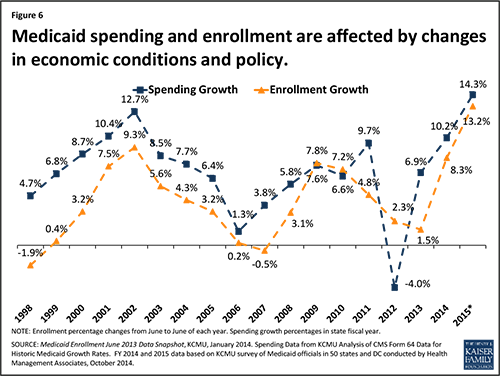
With an improving fiscal climate, many states are increasing benefits for Medicaid recipients and paying their providers more.
The trend is continuing into fiscal year 2015 for those who rely on Medicaid, the state and federal health insurance program for the poor, according to a survey of 50 state Medicaid programsreleased Tuesday by the Kaiser Family Foundation and the National Association of Medicaid Directors. (KHN is an editorially independent program of the foundation.)
The report found that 22 states were expanding Medicaid benefits compared to just two states restricting them in fiscal 2015, which for most states started July 1, 2014. That’s the fewest states cutting or restricting benefits in at least 9 years. The most commonly added benefits were dental coverage, along with mental health and substance abuse services.
However, virtually every state indicated concern about high-cost specialty drugs, especially $1,000-a-pill Sovaldi, approved last year to treat hepatitis C. Officials in 22 states said that new prior authorization rules were in place or under development to restrict use of the drug and New Jersey said it was exploring protocols to do that.
Meanwhile, 14 states were increasing Medicaid fees to specialists in fiscal 2015, compared to three states lowering them. More states were also increasing fees to nursing homes and managed care organizations, the report found. There were two exceptions: 31 states were cutting or freezing Medicaid hospital rates, compared to 19 that were increasing them. And 36 states either were not extending the Medicaid primary care pay raise that began last year under the Affordable Care Act and expires Dec. 31, or had yet to make a decision. Under the law, states had increased Medicaid rates to Medicare levels, a 40 percent average pay raise. Medicare is the federal program for the elderly and disabled.
Though more people enroll in Medicaid during economic downturns, that’s also when states are most likely to cut benefits and provider fees to control costs. When finances improve, states often restore cuts to beneficiaries and providers’ rates — which is what’s been happening the past three years.
“With the improvement in the economy, we see more enhancement or restorations in provider rates and enhancement or restorations in benefits,” said Robin Rudowitz, a study author and associate director of the Kaiser Commission on Medicaid and the Uninsured.
The impact on Medicaid enrollees’ out-of-pocket costs was mixed. Four states in 2014 and 2015 were adding or increasing premiums, while seven states were cutting or eliminating premiums.
Generally, states are allowed to charge premiums only to Medicaid enrollees who have incomes above 150 percent of the federal poverty level. Iowa and Michigan, however, have included premiums for adults qualifying for coverage as a result of the Affordable Care Act.
States have the option this year under the law and a subsequent Supreme Court ruling to expand Medicaid to cover all adults under 138 percent of the poverty level, or $16,100 for an individual. In 2014, 26 states and Washington, D.C. expanded their programs.
Medicaid enrollment has increased by about 8 million people in 2014, according to the latest figures from the Centers for Medicare & Medicaid Services. The program now covers 70 million people.
A second Kaiser Family Foundation report found that states expect Medicaid enrollment growth to accelerate from 8 percent in fiscal 2014 to 12 percent in fiscal 2015. The growth is largely because fiscal 2015 will include a full 12 months of Medicaid expansion, whereas fiscal 2014 included only six months. It also will include more states such as Pennsylvania, which plans to expand on Jan. 1, 2015.
States expanding the program expect to see an 18 percent enrollment jump in fiscal 2015, up from 12 percent in 2014. Non-expansion states saw a 3 percent increase in 2014 and expect a 5 percent rise in 2015, the report found.






